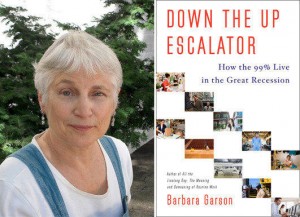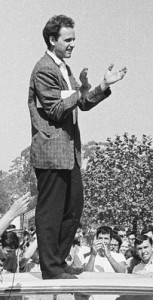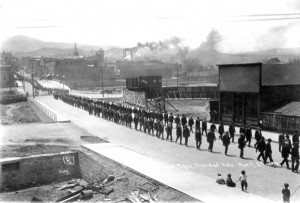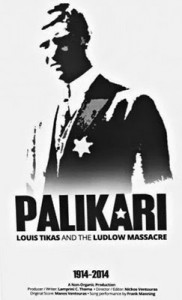Podcast: Play in new window | Download
Updates:
- Professor Salaita Press Conference Update
- Michael Ratner: 13th Anniversary of 9-11
- Michael Ratner: You Can’t Have Imperialism Abroad And Democracy At Home
- Michael Ratner: Basically . . .It’s Over. The Legal System Is Done For.
- Michael Ratner: September 11, 1973 Anniversary – Chilean Coup D’état
- Michael Ratner: September 7, 1971 Anniversary Attica Prison Rebellion
—–
50 Year Anniversary of the Free Speech Movement
The Free Speech Movement began September 14, 1964, marking the 50 year annivesary this month. It began when the University of California at Berkeley announced that existing university regulations banning political activity on campus would be “strictly enforced.” The resulting protests, unprecedented in scope, were the harbinger of the student power, civil liberties, and antiwar demonstrations that convulsed college campuses throughout the country for the next decade. American playwright, social activist and author Barbara Garson joins us to talk about the Free Speech Movement and her most famous work MacBird.
- I was at the University of California at Berkeley and when we got back to campus in 1964 some people from the Freedom Summer in Mississippi, myself working with the farm workers in California . . . we come on to campus and we discover that the area in front of the school that we (all the groups) traditionally used to hand out leaflets about their events and so on, suddenly you couldn’t hand out leaflets there.
- The reason we were given was trash. That is to say litter.
- Pretty soon all the groups, I mean all the groups, the Republicans, the Young Republicans, the Democrats and the Anarchists, we all went to the administration and . . . . they dropped that flimsy excuse.
- They said no, the only thing is you can’t pass out leaflets on campus that advocate action off campus.
- It was obvious not only to the radicals but all the students that some . . powerful people in Berkeley had become annoyed by the farmworkers boycott and the equal employment picket lines in Oakland and had put pressure on the president of the university.
- All the groups realized this wasn’t an issue about litter, it was an issue of free speech.
- Throughout that year of expulsions, arrests, all the groups stood together.
- They stuck together with a very simple demand, that we be able to exercise the freedoms guaranteed by the Constitution of the First and Fourteenth Amendments on the CAL campus.
- We won 100 percent.
- We created a counter force and we stayed with it. I don’t believe in the cult of a personality but Mario Savio really was special.
- The campus police called the Berkeley Police and the Berkeley Police who are very nice put Jack Weinberg in a police car. Suddenly everybody sat down around the police car. There are dozens of people who claim to be the first person to sit down around the police car.
- He (Jack) knew immediately not give his name to step up the action.
- People start getting on the police car to address the crowd. Try to remember back what kind of kids we were. When you look at the pictures we had short hair, we had bright glasses, just really nice kids. (They take off their shoes before getting on police car.)
- One of the people who gets on the police car is Mario Savio who’s been on a Freedom Summer, that summer. The gift that Mario gave us was his utter sincerity.
- He (Mario) created that sense, we’ve come here to do something worthwhile with our lives. We were talking lives, not lifestyle.
- We were very naive and we accept committees to look into the free speech regulations on campus.
- Over the course of six months it became clear to everyone that there was nothing we could do that we would be betrayed.
- Many of the students were most radicalized by being lied to.
- I’m an FSM alumni really, not a Berkeley alumni.
- It’s just natural, they really did agree with us, who doesn’t agree with the First and Fourteenth Amendments.
- We literally voted to dissolve the Free Speech Movement. That’s wrong. We saw the same thing happen with Occupy, from a good impulse, not be like them, we haven’t presented any power to fight them.
- One of the areas where we left no fight, the economic areas which have seen working people beaten down for the 40 years.
- Now when you go to the University of California Berkeley campus you don’t need regulations about speech when most of the students have mortgage sized debts.
- When I went to University of California Berkeley my tuition was free.
- The FSM, well, its in part in sorrow that we meet to figure out how things went this way.
- FSM.org – Reunion Event
Guest – Barbara Garson, an American playwright, author and social activist known for the play MacBird. She wrote a series of books describing American working lives at historical turning points, including All the Livelong Day (1975), The Electronic Sweatshop (1988) and Money Makes the World Go Around (2001). Her new book, just published, is Down the Up Escalator: How the 99% Live in the Great Recession
——-
Louis Tikas and the Ludlow Massacre
Louis Tikas and the Ludlow Massacre is the title of the new documentary film from Greece by Lamprini Thoma and Nickos Ventouras. April 20, 2014 marked the 100th anniversary of the historic attack on workers. In April 1914, the Colorado National Guard and Colorado Fuel and Iron Company Camp Guards began shooting into a tent colony of 1200 striking coal miners and their families in Ludlow Colorado. 39 people were killed including 2 women and 11 children. Among the murdered was Louis Tikas, a Greek immigrant who is remembered in this documentary for his work that helped launch the U.S. labor movement. The story is told through the voices of prominent historians, artists and the descendants of Ludlow miners in Colorado.
- When the situation in Greece . . . we’re not a democracy anymore, you know. When we started losing our working rights, we started having problems with immigrants . . it all became obvious we were back there.
- Me and Nickos who’s my partner in life and in crime, we did the movie together.
- We thought that we didn’t have to say anything, that history could say everything, about people like immigrants, like Greeks and how they suffered, and how they fought for their rights.
- That’s how it became relevant to us now. Not something from history but something from your life, you have to put in your life and you have to say to the other, see this is what happened.
- We musn’t let it happen again.
- Palikari, young men in their prime. Louis Tikas his name is Elias Spantidakis. He left from Crete, late 19th century, went to New York and from there Colorado where he got involved with the unions and he started organizing the Greeks and he saw how hard things were especially for the miners.
- He was a man of peace and of justice I can say.
- He was murdered brutally by the man of the Rockefellers at the time of the Ludlow massacre.
- In this work of ours we’re trying to let the people meet him and see how wonderful a man can be.
- At the time John Rockefeller Sr was passing his power on to John Rockefeller Jr. it was 1914 that the thugs of the Colorado Fuel and Iron Company of the Rockefellers attacked the miners.
- It was the second day of the Greek Easter, a very important time for Greek immigrants. Louis Tikas was the first to be killed among the union men.
- It’s a history then that shows how things were and still are in my opinion for the working class.
- Women were the ones to keep the house, to keep the children fed. To take their place (the men) when they were arrested.
- When working rights move on, all rights start to move on. They’re connected in a way.
- Most people think that Rockefeller was the winner. He killed them when the strike was brought. But he was not, history is the judge there . . . and how it survived in memory.
- They never speak about class war in the United States. They use other phrases.
- Our premiere will be in the CUNY Grad Center in Manhattan September 19, 2014 and we’re expecting to see you there.
- Nonorganicproductions.com – Coal is organic.
Guest-Lamprini Thoma has been working as journalist, radio producer and script writer for the last 30 years. She has covered wars in the Balkans, the former Soviet Union and West Africa. She has worked in print, online and broadcast media, including the BBC’s now defunct Greek service. She created the first specialized newspaper column on the Internet in Greece, something which still makes her proud. Lamprini and Nikos have been working together for the last ten years.
————————————————————————-



